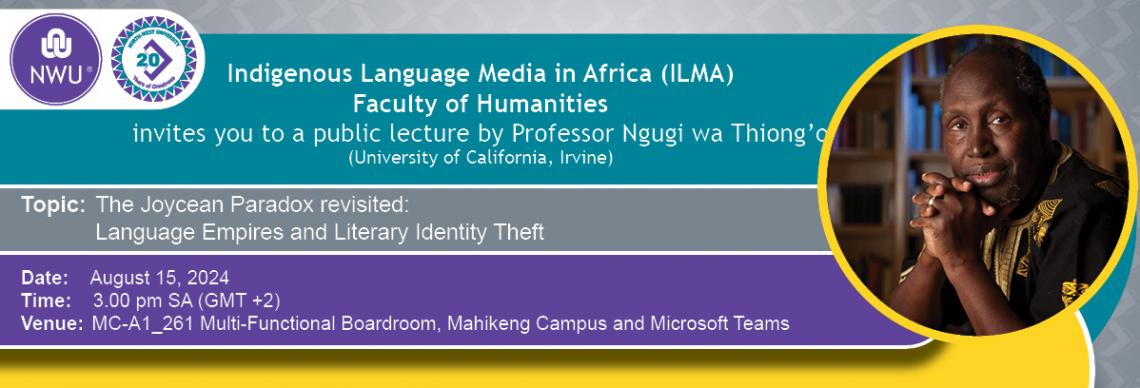
The Indigenous Language Media in Africa (ILMA) cordially invites you to the Public Lecture by Prof Ngugi wa Thiong’o, from the University of California, Irvine.
Topic: The Joycean Paradox revisited: Language Empires and Literary Identity Theft.
Biography
In his crowded career and eventful life, Ngũgĩ wa Thiong’o has enacted, for all to see, the paradigmatic trials and quandaries of a contemporary African writer, caught in sometimes implacable political, social, racial, and linguistic currents.” —John Updike
“Extraordinary. Among the major works of history and literature of our time.” —The Washington Post
Ngũgĩ wa Thiong’o was born in Kenya and educated at Makerere University College (then a campus of London University), Kampala, Uganda, and the University of Leeds, Britain. The Kenya of his birth and youth was a British settler colony (1895-1963). As an adolescent, he lived through the Mau Mau War of Independence (1952-1962), the central historical episode in the making of modern Kenya and a major theme in his early works.
Ngũgĩ burst onto the literary scene in East Africa with the performance of his first major play, The Black Hermit, at the National Theatre in Kampala, Uganda, in 1962, as part of the celebration of Uganda’s Independence.
He is the author of the novel Weep Not Child (1964), published to critical acclaim; followed by his second novel, The River Between (1965). His third, A Grain of Wheat (1967), was a turning point in the formal and ideological direction of his works. Multi-narrative lines and multi-viewpoints unfolding at different times and spaces replace the linear temporal unfolding of the plot from a single viewpoint. The collective replaces the individual as the center of history.
His first novel in ten years, Petals of Blood (1977), paints a harsh and unsparing picture of life in neo-colonial Kenya. It was received with even more emphatic critical acclaim in Kenya and abroad. The Kenya Weekly Review described it as “this bomb shell” and the Sunday Times of London as capturing every form and shape that power can take. The same year Ngũgĩ’s controversial play, Ngaahika Ndeenda (I Will Marry When I Want), written with Ngũgĩ wa Mirii, was performed at Kamirithu Educational and Cultural Center, Limuru, in an open air theatre, with actors from the workers and peasants of the village.
Sharply critical of the inequalities and injustices of Kenyan society, publicly identified with unequivocally championing the cause of ordinary Kenyans, and committed to communicating with them in the languages of their daily lives, Ngũgĩ was arrested and imprisoned without charge at Kamiti Maximum Security Prison in 1977. An account of those experiences is to be found in his memoir, Detained: A Writer’s Prison Diary (1982). It was at Kamiti Maximum Prison that Ngũgĩ made the decision to abandon English as his primary language of creative writing and committed himself to writing in Gikuyu, his mother tongue. In prison, and following that decision, he wrote on toilet paper the novel Caitani Mutharabaini (1981) translated into English as Devil on the Cross (1982).
After Amnesty International named him a Prisoner of Conscience, an international campaign secured his release a year later. However, the Moi dictatorship barred him from jobs at colleges and university in the country. While Ngũgĩ was in Britain for the launch and promotion of Devil on the Cross, he learned about the Moi regime’s plot to eliminate him on his return, or as coded, give a red carpet welcome on arrival at Jomo Kenyatta Airport. This forced him into exile, first in Britain (1982 –1989), and then the U.S. after (1989-2002), during which time, the Moi dictatorship hounded him trying, unsuccessfully, to get him expelled from London and from other countries he visited. In 1986, at a conference in Harare, an assassination squad outside his hotel in Harare was thwarted by the Zimbwean security. His next Gikuyu novel, Matigari (1986), lead to the Moi dictatorship’s removal of wa Ngũgĩ’s books from all educational institutions and Kenyan Bookshops.
Ngũgĩ has continued to write prolifically, publishing what some have described as his crowning achievement, Wizard of the Crow (2006), an English translation of the Gikuyu language novel, Murogi wa Kagogo. wa Thiong’o’s books have been translated into more than thirty languages and they continue to be the subject of books, critical monographs, and dissertations.
In exile, Ngũgĩ worked with the London based Committee for the Release of Political Prisoners in Kenya (1982-1998), which championed the cause of democratic and human rights in Kenya. In between, he was Visiting Professor at Byreuth University; and Writer in Residence, for the Borough of Islington, London; and took time to study film, at Dramatiska Institute in Stockholm, Sweden. After 1988, Ngũgĩ became Visiting Professor of English and Comparative Literature at Yale in between holding The Five Colleges (Amherst, Mount Holyoke, New Hampshire, Smith, East Massachusetts) Visiting Distinguished Professor of English and African Literature. He then became Professor of Comparative Literature and Performance Studies at New York University where he also held the Erich Maria Remarque Professor of languages, from where he moved to his present position at the University of California Irvine. He remained in exile for the duration of the Moi Dictatorship 1982-2002. When he and his wife, Njeeri, returned to Kenya in 2004 after twenty-two years in exile, they were attacked by four hired gunmen and narrowly escaped with their lives.
He is recipient of many honors, including the 2001 Nonino International Prize for Literature and eleven honorary doctorates. Currently, Ngũgĩ is a Distinguished Professor of English and Comparative Literature at the University of California, Irvine.
Click here to join lecture
Meeting ID: 326 920 635 675
Password: CHYdaA
For more information, kindly contact Ms Kgomotso Bosilong.
